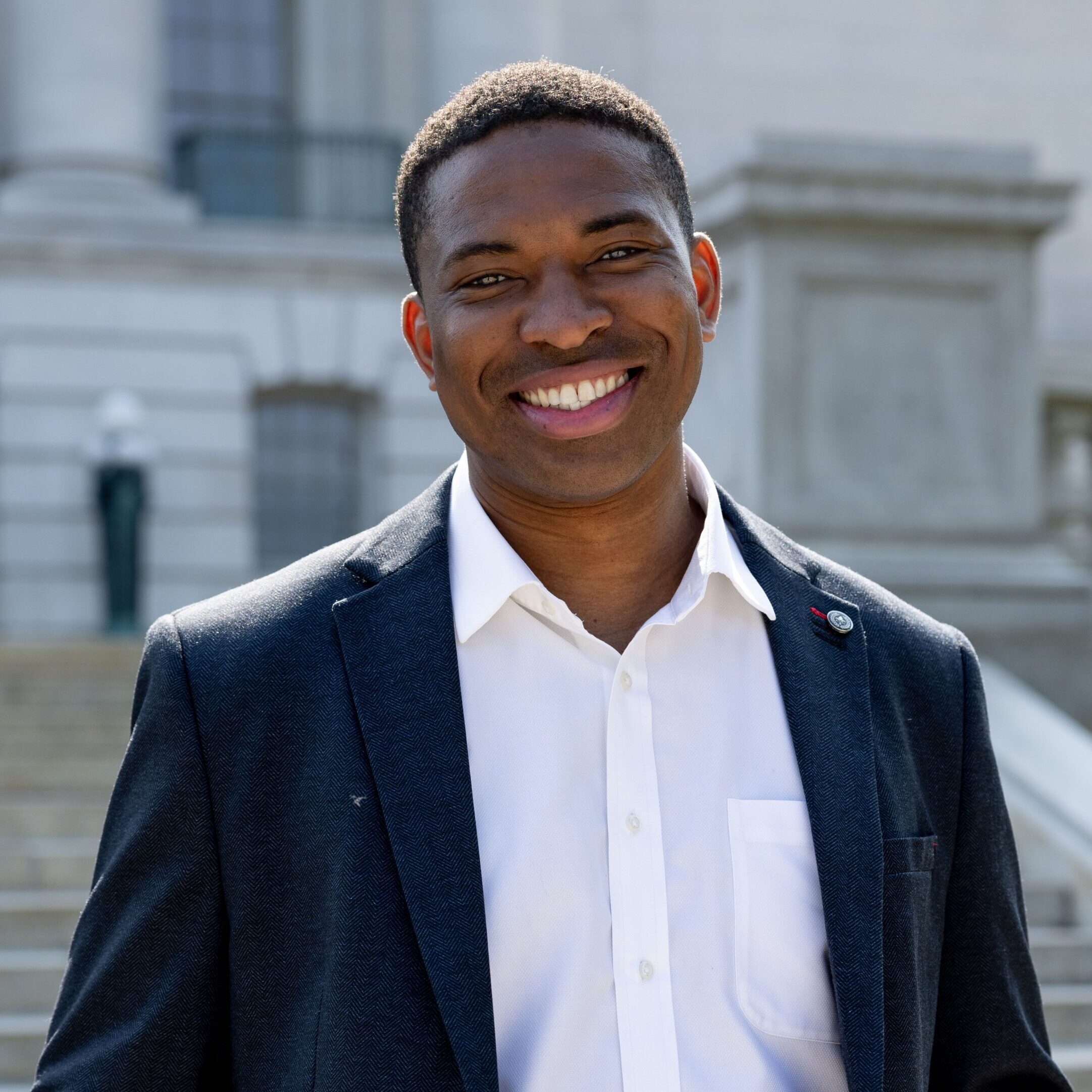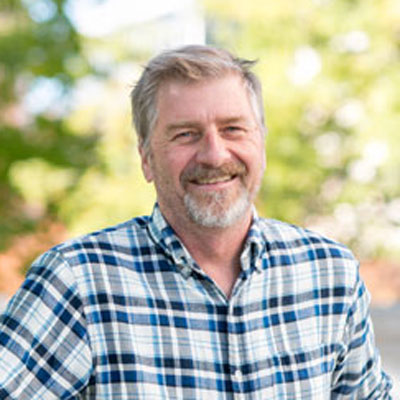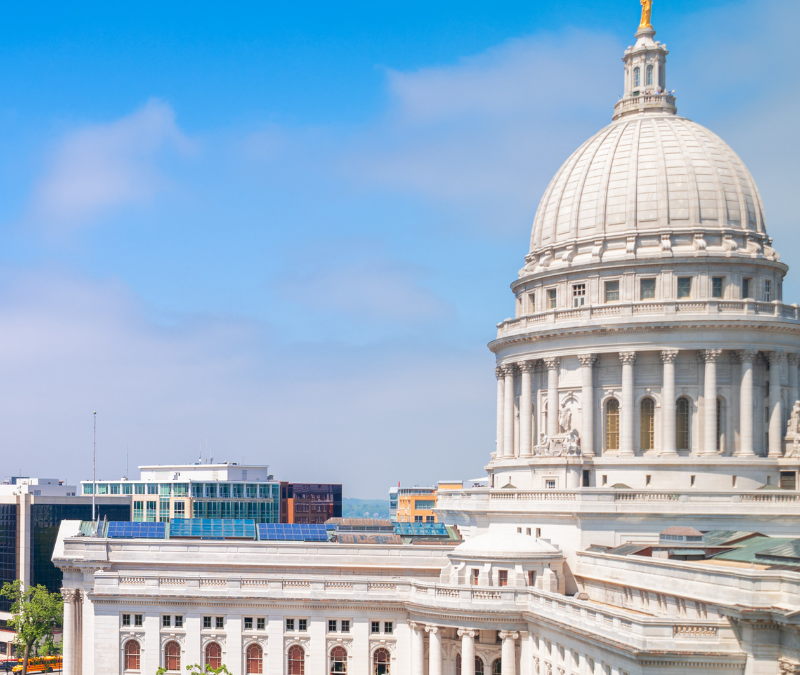
by Beata Wierzba | Dec 21, 2023 | Advocacy, Community Solar, Electric Vehicles, Legislative Watchlist, Local Government, Policy, Solar
Though the year is coming to a close, RENEW Wisconsin’s efforts to support electric vehicle (EV) charging and community solar will continue into 2024. RENEW staff recently had the opportunity to testify before the Senate Committee on Utilities and Technology to share our support for SB 791.
We are also working with the Community Solar Coalition to get a hearing on the community solar bill. The Coalition is reaching out to leadership in the state legislature along with the chairman of the Senate Committee on Utilities and Technology to advance the bill to the next step.
EV Charging – SB 791
RENEW Wisconsin staff testified before the Senate Committee on Utilities and Technology on December 19, 2023. In our testimony we shared our support for SB 791, explaining that it will align the state of Wisconsin’s laws with the National Electric Vehicle Infrastructure (NEVI) Standards and Requirements set by the Federal Highway Administration and qualify for NEVI funds.
NEVI requires that the payment for charging your vehicle be based on kilowatt hours of electricity used rather than time. In Wisconsin, making electricity available by the kilowatt hour (kWh) is restricted for non-utilities. As it stands, the EV stations operating in the state have consumers pay by the amount of time it takes to charge rather than the amount of electricity used.
Allowing private entities to sell electricity by the kWh to charge an electric vehicle without being regulated as a utility will grant Wisconsin $78 million in NEVI dollars. These dollars are needed to fund the build-out of electric vehicle charging infrastructure and establish operational and maintenance standards.
This bill will bring Wisconsin in line with 48 other states and provide uniform access, pricing, accountability, and standards for EV Charging. More importantly, establishing the kWh standard for Wisconsin is time-sensitive as the deadline to qualify for the NEVI funds is the end of February 2024.
During our testimony, we recommend two improvements:
First, we ask for the grandfathering of all existing EV charging facilities up to the date when this new law becomes effective. We believe that early adopters of EV charging should not be forced to make costly changes to their existing systems and investments. Additionally, allowing the current economic and ownership arrangements to continue would not compete with the new systems but rather continue serving the market.
Second, we asked that the bill be modified to allow state government entities to lease land for charging or that they be able to partner with a private entity to host facilities. This change would allow charging stations to be placed in remote places that private businesses may not find suitable.
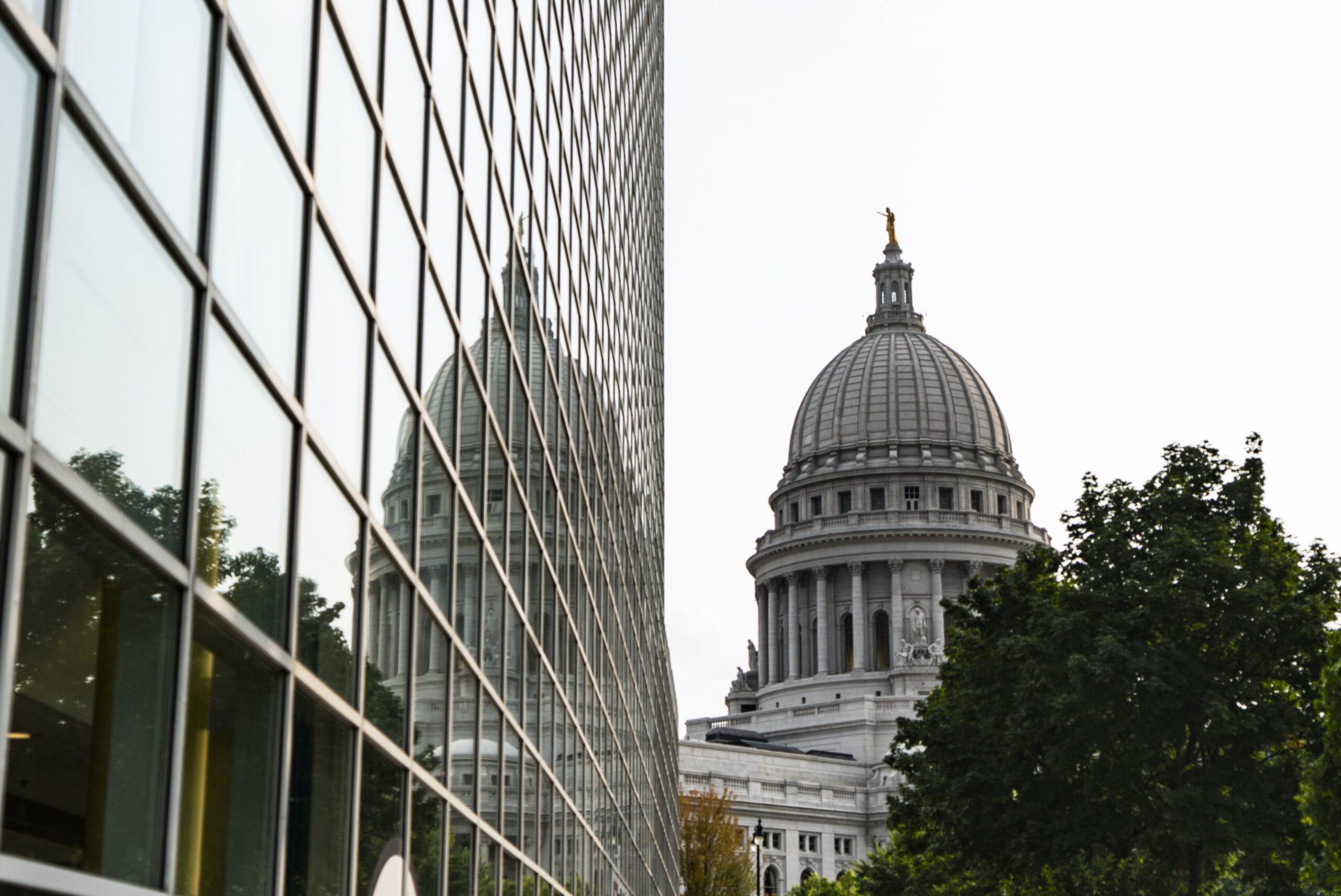
by Beata Wierzba | Nov 22, 2023 | Advocacy, Community Solar, Electric Vehicles, Legislative Watchlist, Local Government, Policy, Solar
RENEW Wisconsin is monitoring several new bills relating to solar and wind project siting, reforms aimed at the Public Service Commission of Wisconsin (PSCW) and utilities, and a slew of proposals from the Forward on Climate legislative package. We are reviewing these bills to determine our position on these proposals. We are also continuing our work to support EV charging infrastructure and bills that would allow Wisconsin residents to participate in community solar projects.
Bills to Watch
On November 16, Wisconsin Democrats reintroduced their Forward on Climate legislative package. In all the package contains 20 bills, which address issues ranging from job creation to inequality. This includes bills that focus on job training grants, racial disparity impact studies, a funding increase for Focus on Energy, on-bill financing, biodigester planning grants, transportation planning, and changes to the energy building code.
RENEW is also monitoring a group of bills that would create reforms for the Public Service Commission of Wisconsin and state utilities. Some of these bills would impact how utilities notify customers of rate increases, alter procedures for complaints filed with the PSCW, impact the closure of large electric generating facilities such as coal plants, and allow the PSCW and interested parties to learn what public utilities are planning for future energy generation.
A final group of bills under review by RENEW staff would directly impact large-scale solar and wind projects. Some of the potential impacts of these bills include requirements to assess agricultural land for productivity before a project is approved, limit ownership of agricultural or forest land by foreign entities, and require notification of neighboring property owners of projects before they are deemed viable.
RENEW staff is reviewing and monitoring all of these bills and will provide regular updates on their progress.
Electric Vehicle Charging
Better access to charging stations to support the electric vehicle industry is a top priority for RENEW. We continue to support efforts to remove some of the barriers in Wisconsin. Current state law limits private companies’ ability to build charging stations by only allowing electric utilities to sell electricity to the public.
- RENEW anticipates legislation (likely led by Sen. Howard Marklein) to be introduced this fall to remove some of these barriers.
- RENEW is hoping the proposed legislation would allow non-utilities to provide electricity at charging stations by using the national standard of charging by the kilowatt hour rather than by the time it takes to charge.
- RENEW staff have been in regular communication with various interested parties and we hope to see movement on this proposal soon.
- To support these efforts, we also have preliminary plans to host educational, lobbying, and test-driving electric vehicle events through the fall.
Community Solar
Wisconsin state law limits solar installations to larger utility-built projects and smaller rooftop installations on individual homes or businesses. This leaves a gap in the options available for some Wisconsinites. Allowing community-based projects for individuals to participate in solar energy generation even if they do not own the building or have adequate sun exposure would create more equity as it relates to solar generation.
RENEW Wisconsin is part of a coalition of groups that support community solar projects, along with two bills introduced earlier this year that would allow Wisconsin residents to participate in community solar projects. SB 226 was authored by Sen. Duey Stroebel, and AB 258 was authored by Rep. Scott Krug.
- RENEW is encouraging the chairman of the committee, Sen. Julian Bradley, to schedule a hearing in the fall in the Senate Committee on Utilities & Technology.
- More than 30 organizations are listed as lobbyists on the proposal, with an almost equal number for and against.
- Utility groups have strongly opposed the bills.
- Supporters along with RENEW include the Alliance of WI Retailers, NAIOP Commercial Real Estate Association, League of WI Municipalities, WI Property Taxpayer Association, and Fieldworks Power. New supporters continue to join the effort.

by Beata Wierzba | Oct 19, 2023 | Advocacy, Community Solar, Electric Vehicles, Legislative Watchlist, Local Government, Policy, Solar
RENEW Wisconsin remains focused on net metering and the two rate cases before the Public Service Commission of Wisconsin (PSCW). The comment periods for both cases have closed and we can expect a decision from the PSCW in early November. In the meantime, we are continuing our work to support EV charging infrastructure while also pursuing bills that would allow Wisconsin residents to participate in community solar projects.
Net Metering
In most states, when you generate electricity from solar panels on your property, you get a credit for the energy you produce, reducing your electricity purchases from the utility and some compensation for sending any excess electricity from your system back to the grid. The Public Service Commission of Wisconsin (PSCW) is nearing a decision in two net metering rate cases.
In the Alliant Energy rate case, RENEW and Alliant have agreed to preserve net metering for two years and have created a clear pathway for future rooftop solar installations. At the end of the two-year period, new Alliant solar customers will shift away from net metering and into Power Partnership, a proposal that will support the sustainability of the solar industry. The PSCW will determine if this agreement is the best path forward when they deliver their decision in November.
RENEW still believes that net metering is the best policy for Wisconsin’s current solar industry, and we remain opposed to MGE’s proposal. We look forward to a positive outcome in both cases.
- RENEW staff has testified in both rate cases before the PSCW.
- RENEW has encouraged and empowered our members and the public to support net metering through the public comments process.
- RENEW staff is engaged with state legislators, making them aware of how these rate cases will affect their constituents and the solar industry in general.
Electric Vehicle Charging
Better access to charging stations to support the electric vehicle industry is a top priority for RENEW. We continue to support efforts to remove some of the barriers in Wisconsin. Current state law limits private companies’ ability to build charging stations by only allowing electric utilities to sell electricity to the public.
- RENEW anticipates legislation (likely led by Sen. Howard Marklein) to be introduced this fall to remove some of these barriers.
- RENEW is hoping the proposed legislation would allow non-utilities to provide electricity at charging stations by using the national standard of charging by the kilowatt hour rather than by the time it takes to charge.
- RENEW staff have been in regular communication with various interested parties and we hope to see movement on this proposal soon.
- To support these efforts, we also have preliminary plans to host educational, lobbying, and test-driving electric vehicle events through the fall.
Community Solar
Wisconsin state law limits solar installations to larger utility-built projects and smaller rooftop installations on individual homes or businesses. This leaves a gap in the options available for some Wisconsinites. Allowing community-based projects for individuals to participate in solar energy generation even if they do not own the building or have adequate sun exposure would create more equity as it relates to solar generation.
RENEW Wisconsin is part of a coalition of groups that support community solar projects, along with two bills introduced earlier this year that would allow Wisconsin residents to participate in community solar projects. SB 226 was authored by Sen. Duey Stroebel, and AB 258 was authored by Rep. Scott Krug.
- RENEW is encouraging the chairman of the committee, Sen. Julian Bradley, to schedule a hearing in the fall in the Senate Committee on Utilities & Technology.
- More than 30 organizations are listed as lobbyists on the proposal, with an almost equal number for and against.
- Utility groups have strongly opposed the bills.
- Supporters along with RENEW include the Alliance of WI Retailers, NAIOP Commercial Real Estate Association, League of WI Municipalities, WI Property Taxpayer Association, and Fieldworks Power. New supporters continue to join the effort.

by Beata Wierzba | Sep 22, 2023 | Advocacy, Community Solar, Electric Vehicles, Legislative Watchlist, Local Government, Policy, Solar
The 2023-24 legislative session in Wisconsin is nearing the halfway point. Much has happened in the last year, and we are hoping to make great strides by the end of the current legislative session.
This year’s biennial budget bill for 2023-25 had several provisions we were monitoring — however, most of them were removed from the final version. The budget did ultimately include a $75 increase to annual registration fees for electric vehicles.
Despite the outcome of the budget bill, there are still opportunities in several key areas. One of our main focuses of late has been net metering and the two rate cases before the Public Service Commission of Wisconsin (PSCW). We are also working to remove barriers in the effort to build EV charging infrastructure while also supporting bills that would allow Wisconsin residents to participate in community solar projects.
Net Metering Proposal
In most states, when you generate electricity from solar panels on your property, you get a credit for the energy you produce, reducing your electricity purchases from the utility and some compensation for sending any excess electricity from your system back to the grid. RENEW Wisconsin has been active in two net metering rate cases before the Public Service Commission of Wisconsin (PSCW).
In the Alliant Energy rate case, RENEW and Alliant have agreed to preserve net metering for two years and have created a clear pathway for future rooftop solar installations. At the end of the two-year period, new Alliant solar customers will shift away from net metering and into Power Partnership, a proposal that will support the sustainability of the solar industry.
RENEW still believes that net metering is the best policy for Wisconsin’s current solar industry, and our opposition to MGE’s proposal continues. The comment period for MGE’s rate case before the PSCW has closed. A final decision from the PSCW in both the MGE and Alliant rate cases is expected in late October or early November.
- RENEW staff has testified in both rate cases before the PSCW.
- RENEW has encouraged and empowered our members and the public to support net metering through the public comments process.
- RENEW staff is engaged with state legislators, making them aware of how these rate cases will affect their constituents and the solar industry in general.
Electric Vehicle Charging
Recognizing the need for better access to charging stations to support the electric vehicle industry, RENEW is working to support efforts to remove some of the barriers created by restrictions in state law. State law limits private companies’ ability to build charging stations by only allowing electric utilities to sell electricity to the public.
- RENEW anticipates legislation (likely led by Sen. Howard Marklein) to be introduced this fall to remove some of these barriers.
- RENEW is seeking a proposal that would allow non-utilities to provide electricity at charging stations by using the national standard of charging by the kilowatt hour rather than by the time it takes to charge.
- RENEW staff have been in regular communication with various interested parties and we hope to see movement on this proposal soon.
- To support these efforts, we also have preliminary plans to host educational, lobbying, and test-driving electric vehicle events through the fall.
Community Solar
Current Wisconsin state law limits solar installations to larger utility-built projects and smaller rooftop installations on private property of individual homes or businesses. What is lacking is the option for community-based projects for individuals to participate in solar energy generation even if they do not own the building or have adequate sun exposure or roof space to accommodate solar installations.
RENEW Wisconsin has joined a coalition of groups that support community solar projects that would provide new opportunities for the industry and customers. Two bills were introduced earlier this year that would allow Wisconsin residents to participate in community solar projects. SB 226 was authored by Sen. Duey Stroebel, and AB 258 was authored by Rep. Scott Krug.
- RENEW is encouraging the chairman of the committee, Sen. Julian Bradley, to schedule a hearing in October in the Senate Committee on Utilities & Technology.
- More than 30 organizations are listed as lobbyists on the proposal, with an almost equal number for and against.
- Utility groups and labor representatives have strongly opposed the bills.
- Supporters along with RENEW include the Alliance of WI Retailers, NAIOP Commercial Real Estate Association, League of WI Municipalities, WI Property Taxpayer Association, and Fieldworks Power.
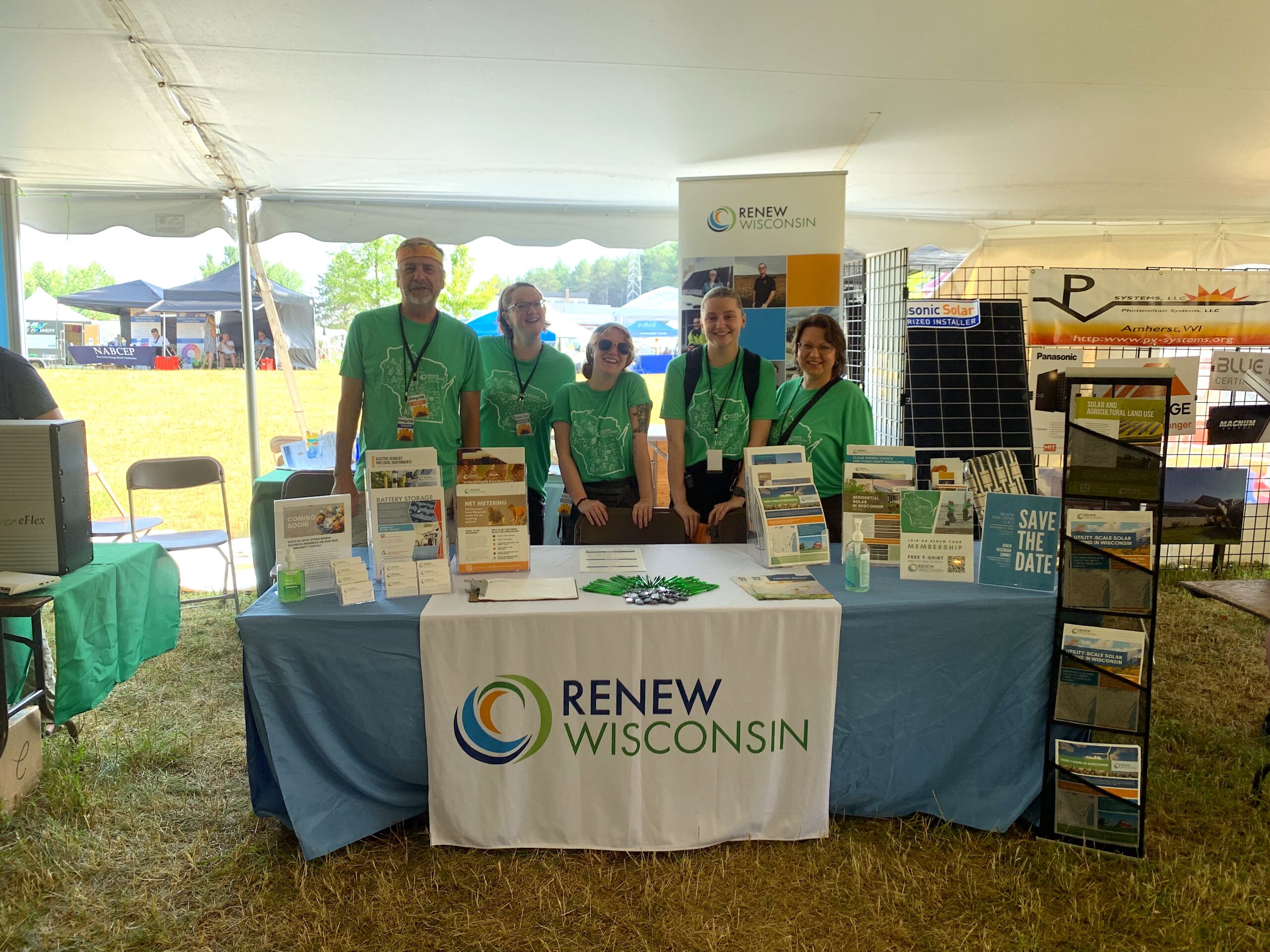
by Julia Holzschuh | Jun 27, 2023 | Electric Vehicles, Electrification, Energy Storage, Events, Inflation Reduction Act, Local Government, Netzero Wisconsin, Policy, Programs, RENEW Wisconsin, Renewables, Solar, Solar for Good, Sustainability, Utility Scale
Last weekend, the Midwest Renewable Energy Association (MREA) hosted the 32nd Annual Energy Fair, bringing people together to learn about sustainability and clean energy, connect with others, and take action toward a sustainable future. The Fair featured workshops, exhibitors, live music, inspiring keynote speakers, family fun, great local food, and more.
RENEW staff presented some compelling workshops and you can download slides from their presentations below.
Zero Carbon by 2050—A Path for Wisconsin
Andrew Kell, RENEW Policy Director, discussed zero-carbon goals and ongoing planning efforts in Wisconsin. Andrew also was a guest on a live podcast, focused on Wisconsin’s Net Zero future.
MadiSUN Workforce Training
Lauren Cohen, RENEW Program Coordinator, held a workshop regarding career growth opportunities within Wisconsin’s clean energy industry, focusing primarily on opportunities within the solar industry.
Vehicle-to-Grid: Opportunities and Challenges
Francisco Sayu, RENEW Emerging Technology Director, discussed how Vehicle-to-Grid technology unlocks the energy stored in electric vehicles and opens opportunities for energy trading, energy management, and grid resiliency.
Farming Sunshine: Solar and Ag Land Use
Nolan Stumpf, one of RENEW’s Interns, presented a session regarding solar farms and the opportunities and challenges of using the land for farming purposes and advancing clean energy.
Can Clean Energy Overcome Local Opposition?
Michael Vickerman, RENEW Clean Energy Deployment Manager, discussed the opposition clean energy faces at the local level and how to overcome those barriers.
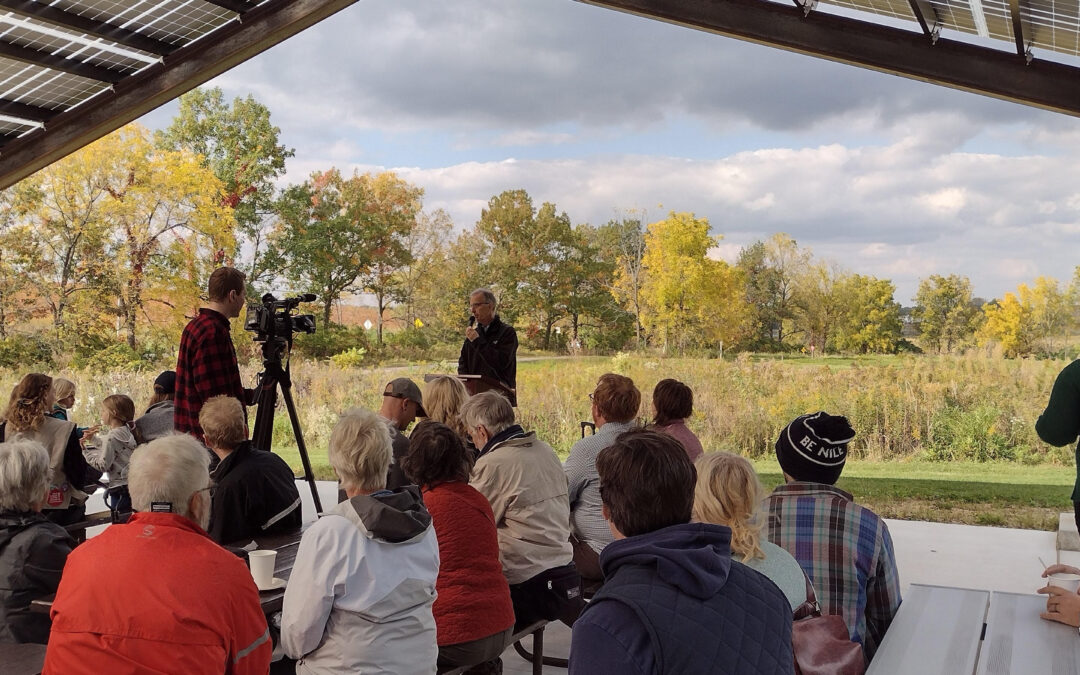
by RENEW Wisconsin | Oct 31, 2022 | Advocacy, Community, Local Government, Local Initiatives, Press Release, RENEW Wisconsin
On Thursday, October 6th, County Executive Joe Parisi joined the Office of Energy and Climate Change (OECC) to recognize local entities leading on climate action through Dane County’s Climate Champions program. The aim is to celebrate local leadership in fulfilling the goals outlined in Dane County’s Climate Action Plan, which commits Dane County to reduce greenhouse gas emissions 50% county-wide by 2030 and puts the county on a path to be carbon-neutral by 2050.
This year 87 Climate Champions are being awarded, representing 77 organizations. The Office of Energy & Climate Change recognizes achievements across ten categories, including:
- Building Energy Use -for entities with very energy-efficient buildings.
- Building Design -for still-under-construction facilities projected to be very energy efficient.
- Fleet Operations -for entities with a fleet powered by clean fuels.
- Employee Commuting -for entities where the workforce commutes via bike, walking, transit, or telecommuting.
- Water Saving Practices -for entities that have implemented practices to reduce water usage.
- Waste Diversion Practices -for entities that have strong waste diversion practices.
- Sustainable Land Use Practices -for farms and land with strong sustainability practices.
- Catalysts -entities that help others take climate actions.
- GHG Emissions -for entities that have reduced their carbon footprint.
- Other -for entities that have taken actions that don’t fit into other categories.
Entities that achieve Climate Champion status receive signage and recognition on the OECC website.
“We are excited to celebrate another cohort of Climate Champions,” said Dane County Executive Joe Parisi. “The leadership these organizations are taking to enhance their sustainability and meet our climate goals is admirable and inspiring to others.”
Each Climate Champion category has four levels of distinction, with four stars indicating the highest level of achievement in that category. In 2022, six entities representing three projects are receiving four stars. These entities include design craft Advertising, Greater Madison MPO, Madison Friends Meeting (Religious Society of Friends), and its building team: Ferch Architecture, Ideal Builders, and Full Spectrum Solar.
Additionally, nine local entities are earning awards in two or more categories, including design craft Advertising; Mad Local Food Group LLC, dba “Pasture and Plenty”; Madison Christian Community; Middleton Community Church, UCC; Monona Grove School District; Summit Credit Union; Sun Prairie Area School District; UW-Madison; and Willy Street Grocery Cooperative.
“The Climate Champions program is an important way for us to recognize how organizations across the county are helping to accelerate climate action. We are energized by how much this program has grown since its inception and are hopeful the actions these organizations are taking can spur additional action across Dane County,” Parisi added.
The full list of 2022 Dane County Climate Champions:
- AprilAire – AprilAire achieved 2022 Climate Champion (Catalyst) status for developing ENERGY STAR-certified dehumidifiers and fresh air ventilators that help customers make their homes more energy efficient.
- Arch Solar – Arch Solar achieved 2022 Climate Champion (Catalyst) status for helping over 100 homeowners install nearly 1 MW of solar in Dane County over the past two years. In addition, Arch Solar volunteers with renewable energy nonprofits to educate the community about solar and related technologies and has received grants to grow the solar workforce in underserved areas.
- Bayview Foundation and its construction partners Horizon Development Group, Kubala Washatko Architects, SmithGroup, Spire, and Design Engineers – Bayview Foundation and partners achieved 2022 Climate Champion (3 Star/Building Design) status for their redevelopment of the Bayview affordable housing units and community center. These apartment buildings and community centers incorporate high energy efficiency features, including Passive House for the Community Center and ENERGY STAR for the townhomes. The facility is projected to use just a quarter of the energy used by comparable facilities.
- Belle Farm – Belle Farm achieved 2022 Climate Champion (3 Star/Other) status for the Belle Farm development. The 44-acre eco/agri/wellness neighborhood in Middleton is planned to create a sustainable, walkable community of 880 dwelling units. To achieve near-net zero, all facilities will use geothermal heating and cooling, rooftop solar, passive design measures, and robust EV capabilities.
- Biological Farming Friends – The Biological Farming Friends achieved 2022 Climate Champion (3 Star/Sustainable Land Use) status for sustainable land practices, including using cover crops, reducing fertilizer and chemical inputs, and increasing the use of no-till agriculture on over 10,000 acres since 2018, as well as adopting rotational grazing on over 500 acres. Creating resilient farming systems has reduced carbon emissions and sequestered carbon on marginal cropland through perennial covers.
- Boys & Girls Clubs of Dane County and its construction partners OPN Architects, JSD, Hooper, Staff Electric, and Dave Jones Plumbing – Boys & Girls Clubs of Dane County and partners achieved 2022 Climate Champion (1 Star/Building Design) status for their new Workforce Training Center. The center will use approximately 25% less energy than a comparable facility and include geothermal heating and solar panels to support student learning about sustainable construction.
- Capital Area Regional Planning Commission – The Capital Area Regional Planning Commission achieved 2022 Climate Champion (3 stars/Employee Commuting) status for 90% of employees regularly telecommute, bike to work, or take mass transit to work than driving alone.
- City of Madison
- The City of Madison achieved 2022 Climate Champion (3 Star/Building Energy Use) status for Fire Station 13, which uses around 75% less energy than similar buildings through a combination of solar power, geothermal, and passive lighting systems that are efficient and cost-effective.
- The City of Madison achieved 2022 Climate Champion (2 Star/Building Energy Use) status for Pinney Library, which uses over 50% less energy than a comparable building. The LEED® Gold building has geothermal energy and LED lighting with daylight sensors.
- The City of Madison achieved 2022 Climate Champion (1 Star/Building Energy Use) status for the Police Training Center, which uses about 25% less energy than a comparable building.
- The City of Madison achieved 2022 Climate Champion (1 star/Building Energy Use) status for the Water Utility Building, which uses approximately 25% less energy than a comparable building.
- City of Sun Prairie – The City of Sun Prairie achieved 2022 Climate Champion (2 Star/Employee Commuting) status for creating policies such as telecommuting, carpool facilitation, and emergency rides that encouraged 45% of employees to choose not to drive alone to work.
- Cooper’s Tavern – The Cooper’s Tavern achieved 2022 Climate Champion (1 Star/Other) status for using local, organic, and sustainably sourced food to reduce emissions for transporting food; working to recycle fryer oil into biodiesel for farmyard vehicles; partnering with university students to turn food waste into compost, and using recycled materials in takeout packaging and other paper materials.
- Couillard Solar Foundation – Couillard Solar Foundation achieved 2022 Climate Champion (Catalyst) status for helping 41 sites in Dane County acquire a total of 2.58 MW of solar power via grants to nonprofits and schools.
- CUNA Mutual Group and its construction partners Eppstein Uhen Architects (EUA) and Affiliated Engineers (AEI) – CUNA Mutual Group and partners achieved 2022 Climate Champion (1 Star/Building Design) status for their rebuilding of the 5810 Mineral Point Road building. The energy-efficient building will use approximately 25% less energy than a comparable building. It will support employee well-being and offer outdoor spaces with native vegetation, while captured rainwater will be used for irrigation and building flush fixtures, saving 348,000 gallons of water a month.
- designCraft Advertising – DesignCraft Advertising achieved 2022 Climate Champion (4 Star/Employee Commuting) status for allowing all employees to telecommute rather than travel to the office in person. They also achieved 2022 Climate Champion (2 Star/Greenhouse Gas Emissions) status for having corporate emissions lower than 70% of their peer companies.
- Door Creek Orchard – Door Creek Orchard achieved 2022 Climate Champion (3 Star/Sustainable Land Use) status for sustainable land practices on the 80-acre property since 1984. These include reduced or no-till agriculture, continuous cover crops, increased nitrogen use efficiency, active tree maintenance, rotational grazing, controlled burns, and 16-plus acres of prairie/wetland restoration.
- Drews Solar LLC – Drews Solar achieved the 2022 Climate Champion (Catalyst) for installing rooftop solar arrays and electric car chargers to help families produce 90-110% of their annual electricity needs. The company is on track to install over 2,000 solar panels in 2022.
- Edgerton Hospital – Edgerton Hospital achieved 2022 Climate Champion (1 Star/Building Energy Use) status. The hospital, which features geothermal heating and cooling, uses about 25% less energy than a comparable hospital. Edgerton Hospital was the first hospital in Wisconsin to be built with geothermal heating and cooling.
- Filament Games – Filament Games achieved 2022 Climate Champion (3 Star/Employee Commuting) status for allowing all employees who would like to work from home to do so, resulting in less than 6% of employees regularly driving alone. This also allowed the office to downsize to less than a tenth of its previous square footage when the company’s employee count is the highest it’s ever been.
- First Unitarian Society of Madison – First Unitarian Society of Madison achieved 2022 Climate Champion (1 Star/Building Energy Use) status. Solar power and energy-efficient features enable this campus to use about 25% less energy than comparable facilities. FUS Madison achieved LEED® Gold status in 2009 with a modern addition that featured ground source heat pumps. After the addition, the FUS green team continued to pursue energy savings with a large solar array and smart HVAC management.
- Girl Scout Troops #1477 & #1952 – Girl Scouts of Wisconsin Badgerland Council – Girl Scout Troops #1477 and #1952 achieved 2022 Climate Champion (Catalyst) status for their advocacy to reduce the embodied carbon of building materials, including concrete. Through two videos and various in-person and virtual presentations, the Girl Scouts reached thousands of building professionals worldwide. Locally they inspired the City of Madison Engineering Department to explore low-carbon concrete options and hosted a virtual roundtable to facilitate dialogue between local building industry groups.
- Glass Nickel Pizza Co, West – Glass Nickel Pizza Co, West achieved 2022 Climate Champion (1 Star/Other) status for taking sustainable actions every day, including shopping locally, using recycled materials, reducing single-use plastics, composting, and recycling fryer grease.
- Greater Madison MPO – Greater Madison MPO achieved 2022 Climate Champion (4 Star/Employee Commuting) for encouraging alternate transportation options so that no employees regularly commute to work by driving alone.
- Green Box, LLC – Green Box achieved 2022 Climate Champion (Catalyst) status for collecting and composting 26,000 pounds of food waste in seven months, preventing that waste from ending in a landfill, and producing methane.
- HGA – HGA achieved 2022 Climate Champion (Catalyst) status for working with clients to design energy-efficient new and retro-commissioned buildings with renewable energy and reduced embodied carbon. Recent HGA clients include SSM Health, Sun Prairie School District, Oregon School District, and Middleton Business Park.
- Holy Wisdom Monastery – Holy Wisdom Monastery achieved 2022 Climate Champion (3 Star/Sustainable Land Use) status for sustainable land practices, including 190 acres of continuous cover, 170 acres managed with controlled burns, 130 acres of native prairie restoration, and a restored lake.
- Legacy Solar Co-op – Legacy Solar Co-op achieved 2022 Climate Champion (Catalyst) status for increasing solar education and adoption of solar in Dane County. In 2020 and 2021, they educated hundreds of residents and supported 32 installations for 245 kW of solar. Legacy Solar Co-op (LSC) is a statewide member-owned cooperative that provides expert consulting and financing services to facilitate solar projects for communities and nonprofits in Wisconsin.
- Mad Local Food Group LLC, dba “Pasture and Plenty” – Pasture and Plenty achieved 2022 Climate Champion (3 Star/Waste Diversion Practices) status for diverting at least 60% of their waste from the landfill via minimizing packaging and other raw materials, incentivizing reuse, reducing contamination of the waste streams, recycling, and composting. Pasture and Plenty also achieved 2022 Climate Champion (2 Star/Greenhouse Gas Emissions) status for having fewer emissions than at least half of the comparable businesses. Pasture and Plenty achieved lower emissions via bike delivery of meal kits, buying local food, reducing energy usage in their building, and buying green power. Pasture and Plenty advocates for environmental equity through food access programs, community classes, and training.
- Madison Christian Community – Madison Christian Community achieved 2022 Climate Champion (3 Star/Sustainable Land Use) status for sustainable land practices on their 0.66-acre property, which they have been implementing since 1970. They have practiced reduced/no-till agriculture, controlled burns, and riparian/wetland restoration on their land. They also achieved 2022 Climate Champion (1 Star/Water Saving Practices) status for minimizing winter salt application, installing rain barrels and green infrastructure, and using native plants.
- Madison Friends Meeting (Religious Society of Friends) with its construction partners Ferch Architecture, Ideal Builders, and Full Spectrum Solar – Madison Friends Meeting (Religious Society of Friends) and its partners achieved 2022 Climate Champion (4 Star/Building Design) status for their renovation of Friends Meetinghouse. A geothermal heating and cooling system coupled with rooftop solar arrays make the facility nearly net-zero in energy consumption. In addition to using less than 20% of the energy of comparable facilities, the Meetinghouse is now all electric. Project partners include Friends Meeting renovation managers Susan Kummer and Richard Pifer; David Ferch, architect; Hein Engineering Group; Ideal Builders; Full Spectrum Solar; Legacy Solar Co-op; Johnson Bank; and Quaker Power and Light.
- Metcalfe’s Markets – Metcalfe’s Markets achieved 2022 Climate Champion (Catalyst) for their commitment to local producers and using food miles signs to help shoppers make sustainable choices by understanding where their food comes from and their carbon footprint. The stores also have a strong tradition of sustainable practices, including reducing single-use plastics, using renewable electricity, and working to minimize food excess.
- Middleton Community Church, UCC – Middleton Community Church UCC achieved 2022 Climate Champion (Catalyst) status for their Earth Day Every Day: EV Car & Sustainability Show. Over 150 people visited the event, with 25 electric cars on display, e-bikes for test-driving exhibits from numerous local solar and environmental organizations, electric lawn equipment, and more. They also achieved 2022 Climate Champion (1 Star/Greenhouse Gas Emissions) status for having 45% fewer carbon emissions than a similar church.
- Midwest Solar Power – Midwest Solar Power achieved 2022 Climate Champion (Catalyst) status for installing over 650 kW of residential and small commercial solar in 2021 and providing education about solar.
- Monona Grove School District
- Monona Grove School District achieved 2022 Climate Champion (2 Star/Building Energy Use) status for Granite Ridge, a new elementary school in Cottage Grove that uses about half the energy of a comparable school.
- Monona Grove School District and its construction partner McKinstry Inc. LLC achieved 2022 Climate Champion (1 Star/Building Design) status for the energy efficiency upgrades and addition of solar panels on the roof of Monona Grove High School. The solar array is the largest in a K-12 school in Wisconsin and should provide about half of the school’s electric usage.
- Odyssey Farm – Odyssey Farm achieved 2022 Climate Champion (3 Star/Sustainable Land Use) status on 14 acres, focusing on regenerative agricultural practices such as continuous cover, rotational grazing, increased nitrogen efficiency, and tree maintenance.
- Promega – Promega achieved 2022 Climate Champion (2 Star/Building Energy Use) status for the Kornberg Center. A 250 kW solar array and ground source heat pumps reduce the building’s energy needs, while a 50,000-gallon rainwater collection system and green roof reduce stormwater run-off. The center uses less than half as much energy as comparable facilities.
- Purple Cow Organics – Purple Cow Organics achieved 2022 Climate Champion (1 Star/Other) status for manufacturing compost that will increase the organic matter in soil and improve the soil’s ability to sequester carbon. Purple Cow processes an average of 18 million pounds of green material annually, resulting in over 4,000 additional tons of carbon sequestered this year.
- RENEW Wisconsin – RENEW Wisconsin achieved 2022 Climate Champion (Catalyst) status for leading the MadiSUN program, which makes it easier for households across Dane County to access solar power. As part of MadiSUN, RENEW is also developing a workforce development plan to increase the solar labor force in Dane County by recruiting candidates from historically underserved populations, providing training, and connecting them with potential employers.
- RenewAire – RenewAire achieved 2022 Climate Champion (2 Star/Building Energy Use) status. Leveraging natural daylighting and LED lighting, the LEED® gold-certified building uses only half as much energy as comparable facilities.
- Short Stack Eatery – Short Stack Eatery achieved 2022 Climate Champion (2 Star/Waste Diversion Practices) status for its efforts to minimize waste, incentivize reuse, reduce packaging, and minimize contamination. This has resulted in diverting over 50% of their waste from landfill.
- Slipstream – Slipstream achieved 2022 Climate Champion (Catalyst) status for helping to develop energy-efficient affordable housing via the Bayview project, hosting webinars and classroom events to educate building professionals, and managing the Commercial Property Assessed Clean Energy (C-PACE) program to help property owners obtain low-cost loans for energy efficiency, renewable energy, and water conservation.
- Standard Imaging, Inc. – Standard Imaging achieved 2022 Climate Champion (3 Star/Building Energy Use) status. With solar panels and geothermal heating and cooling, the building is fully electric and uses just a quarter of the energy of a comparable facility.
- Summit Credit Union
- Summit Credit Union achieved 2022 Climate Champion (1 Star/Building Energy Use) status for their Headquarters building, which has solar panels, a rainwater cistern for irrigation, a white roof, electric car charging, and prairie landscaping, resulting in over 25% less energy usage than a similar building.
- Summit Credit Union achieved 2022 Climate Champion (1 Star/Other) status for supporting employees and members in sustainability efforts through a Summit Sustainability Champions group, offering energy efficient and solar loans, reducing waste, and participating in environmental events.
- Sun Badger Solar – Sun Badger Solar achieved 2022 Climate Champion (Catalyst) status for installing over 60 residential solar arrays in Dane County in 2022 with a combined capacity of 555 kW and an annual output of almost 750,000 kWh of electricity.
- Sun Prairie Area School District
- Sun Prairie Area School District and its construction partners Bray Architects, Fredericksen Engineering, Muermann Engineering, and HGA – Sun Prairie Area School District and its partners achieved 2022 Climate Champion (2 Star/Building Design) status for West High School. A solar array will provide 10% of the building’s energy, while geothermal heat pumps and LED lighting will reduce the school’s energy consumption. The school is expected to use about half as much energy as a comparable school.
- Sun Prairie’s Patrick Marsh Middle School achieved 2022 Climate Champion (2 Star/Other) status for a student project to reduce food waste at the school. Students developed initiatives to reduce up to 60% of wasted food heading to the landfill and partnered with the City of Sun Prairie to lead composting classes.
- SunVest Solar LLC – SunVest Solar achieved 2022 Climate Champion (Catalyst) status for developing and installing commercial and distribution-level utility solar projects. Past projects include the 1.85 MW array at Madison College. SunVest is working with Dane County and Alliant Energy to complete the 17 MW Yahara Solar Project to provide renewable energy to Dane County facilities. In addition, SunVest works to educate students and other community members on the benefits of solar.
- Sustain Dane – Sustain Dane achieved 2022 Climate Champion (Catalyst) status for their Climate Action Program, which resulted in 143 climate action commitments and another educational program to inspire climate action across the county.
- The Neutral Project and its construction partners Michael Green Architecture, Equilibrium Engineers, ARUP, and RDH – The Neutral Project and partners achieved 2022 Climate Champion (3 Star/Building Design) status for Bakers Place, a new apartment building featuring mass timber construction, green roofs, a community garden, and electric car and bike sharing. The 15-story building was designed to reduce both operational and embodied carbon emissions. The building is projected to use just a quarter of the energy of comparable facilities.
- UW Health
- UW Health achieved 2022 Climate Champion (3 Star/Building Energy Use) status for the UW Health Union Corners Clinic at 2402 Winnebago St., which uses about a quarter of the energy of similar clinics. The LEED® Silver clinic was a 2 Star Climate Champion in 2020 and has continued to improve, earning it 3 Stars and an ENERGY STAR Rating of 98.
- UW Health achieved 2022 Climate Champion (1 Star/Building Energy Use) status for the UW Health hospital at 4602 Eastpark Blvd, which is 20% more energy efficient than average hospitals. This building was recognized as an “Emerging” Champion in 2020 but has continued to improve, earning an ENERGY STAR score of 81.
- UW Madison
- UW Madison achieved 2022 Climate Champion (1 Star/Building Energy Use) status for Cooper Hall, which is approximately 25% more energy efficient than similar buildings. The building uses centrally supplied steam and chilled water to heat and cool the building.
- UW Madison achieved 2022 Climate Champion (2 Star/Employee Commuting) status for having 40% of UW Madison employees commute to work by bike, bus, carpool, or on foot most of the time, with additional employees able to telecommute. Programs such as discounted employee bus pass, campus bus service, covered bike storage, carpool programs, custom route planning assistance, and the emergency ride home program reduce single-passenger driving.
- Village of McFarland Police Department – The village of McFarland Police Department is recognized as an Emerging 2022 Champion (Fleet Operations) for purchasing its first battery electric police vehicle for its fleet.
- Willy Street Grocery Cooperative – Willy Street Grocery Cooperative achieved 2022 Climate Champion (3 Star/Waste Diversion Practices) status for its efforts to minimize waste and increase recycling and composting, resulting in over 60% of waste being diverted from landfill. They also achieved 2022 Climate Champion (2 Star/Water Saving Practices) status for their food waste reduction measures, efforts to educate customers about water-saving practices, and installation of green infrastructure for gardening and run-off reduction.
- Wisconsin Creation Care Ambassadors – Wisconsin Creation Care Ambassadors achieved 2022 Climate Champion (Catalyst) status for supporting faith communities interested in reducing their energy use or “greening” their building by adding solar panels, etc. They act as ambassadors for climate action by reaching out to congregations and providing speakers. In addition, they created a green team network to offer opportunities to environmentally-minded members of Dane County faith communities to network, collaborate, and inspire each other.
To learn more about the 2022 Climate Champions, visit the Dane County of Energy and Climate Change website and the related Climate Champions map.






